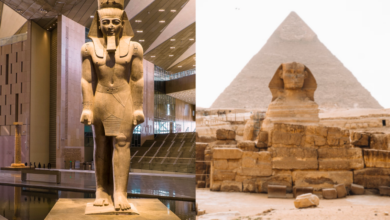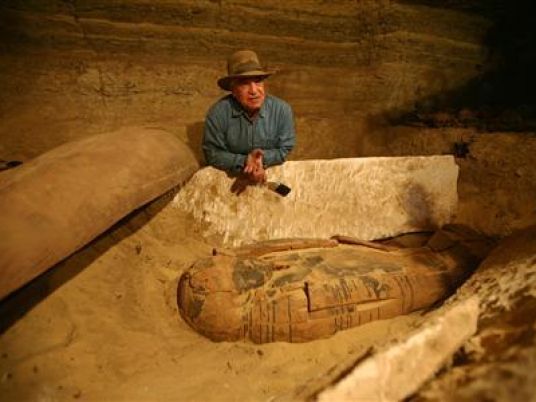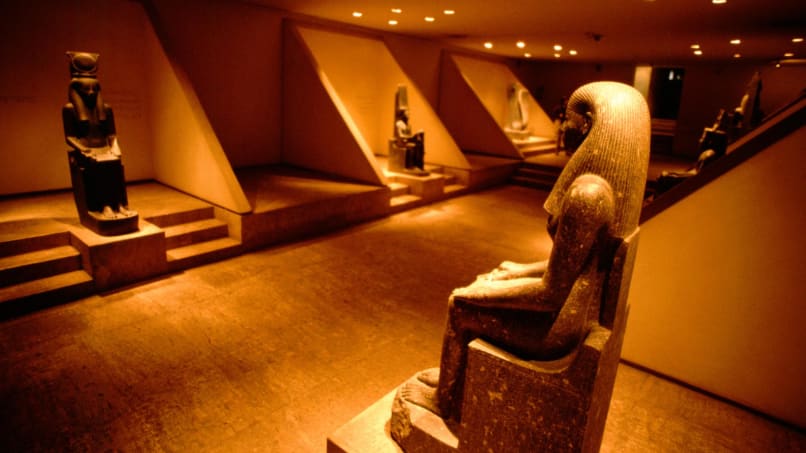A symposium was held yesterday at the Egyptian Museum by prominent author Youssef Maati and Engi Fayed, office manager for cultural development of the Supreme Council of Antiquities.
The symposium, which lasted for almost two hours, focused on the relationship between Pharaonic history and Maati’s literary works including his movies, plays and books.
Most of Maati’s works are influenced by Pharaonic civilization, Maati said, adding, "I used to work as a tour guide for a long time before starting my writing career, which instilled in me a profound appreciation for Pharaonic heritage."
Among his movies with Pharaonic references are "Arees men Geha Amneya" or (A Groom from the Security Entity) that points to the cat goddess Bastet (also known as Bast and Basthet) of sensual pleasure and the protector of the household. In addition his movie "Tabbakh el-Rayyess" or (The President’s Chief) was inspired by an ancient Pharaonic story of an eloquent peasant. The life of Hatshepsut also influenced his play Hobb Fel Takhsheeba (Love in Custody), and the film "el-Sefara fel Omara" (The Embassy is in the Building) referred to Egyptian Pharaohs who used to cultivate their lands over 7000 years ago.
During the symposium, Maati talked about his latest book Karasi (Chairs) in which he depicted a number of chairs that speak about the importance of the events they witnessed. "Our whole life revolves around chairs. So what if these chairs talked? What would they say? That was the idea that drew my attention," said Maati explaining how the idea originated.
"I chose 11 chairs, among them are a chair at the Oval office, on which the previous American president Bill Clinton was holding the office. Another story is the throne of King Tutankhamen, one of the famous chairs in history, that depicts the political vacuum in Egypt during this period which reflects our current circumstances."
Among the attendees was the actor Mohie Ismail, who demanded that the Cultural Development Fund and Egyptian businessmen cooperate to support tourism and culture works. "It’s unbelievable that we don’t have any Egyptian movies to represent us in the official selection at the Cannes Film Festival." he said.
In the same context, Maati pointed out the importance of spreading Pharaonic culture among Arabs, especially Egyptians. “It is illogical that foreigners are more acquainted with our history than we are,” adding that, "we are in dire need of shooting more movies and series about Pharaonic history in order to bridge the gap between Pharaonic civilization and Arab’s unfamiliarity."
He then expressed his interest in writing a movie script about the Pharaohs, to be shot at the Avenue of the Sphinxes (Tareeq el-Kebash) that joins the Luxor and Karnak Temples, one of the most important projects undertaken by the Supreme Council of Antiquities, “Through this movie we can display the greatness of Pharaohs’ architecture to the whole world,” said Maati.
“It is true that the rate of Arab visitors, including Egyptians is very low in comparison to foreign visitors,” said Fayed.
She also emphasized Maati’s idea that art has a profound influence on people, mentioning that “Egyptians got to know the goddess Bastet only through the movie ‘Arees men Geha Amneya.’”
Maati wrapped up the symposium by calling for the preservation of antiquities and the promotion of tourism, as it will guarantee a national income and will contribute to the livelihoods of millions of people.




